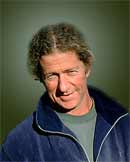
Svend Bayer



Svend Bayer
Michael Cardew said of Svend Bayer "I speak of him with awe and fear. He is more than just a potter, he is a force of nature. Everything comes to him so easily. Now one could say 'ah, this kind of facility must be dangerous to his talent'. Then you can say the same about the infant Mozart. I'm not saying that Svend is Mozart. What I do say is that he is easily my best pupil and I believe that his extreme facility will be very useful to his talent." *
Strong words from Cardew, considering that music played a more important part in his life than pottery, and that he considered Mozart the supreme composer.
Svend Bayer is best known for his large garden pots, but also makes domestic wares. He uses a wood-fired, cross-draught, single-chamber 800 cu.ft. kiln, and is based in Sheepwash, Devon.
He was born of Swedish parents in Uganda in 1946, and came to England when he was sixteen. He studied at Exeter University from 1965 to 1968 and started working with Michael Cardew at Wenford Bridge in 1969. In 1972 he joined the Brannam Pottery where he worked as a thrower for a year. After travelling in the Far East, Asia and the U.S.A., he set up his workshop in Devon.
His work is sometimes plain, sometimes boldly decorated, often with large bird designs.
Svend is a member of the Gnarly Dudes group who exhibit annually at Powdermills Pottery in Dartmoor.
* Quoted from Michael Cardew, a portrait by Garth Clark

Michael Cardew moved from Winchcombe to Wenford Bridge on the edge of Bodmin Moor in Cornwall with his wife, Mariel, and his three young sons in June 1939. They bought the derelict Wenford Inn for £500 and started to convert it for use as a pottery.
Before the conversion was finished, war broke out, and after only two glaze firings at Wenford Cardew had to return to Winchcombe to help Ray Finch who had been badly affected by the conscription of both Charlie and Sid Tustin. He stayed there until June 1942. While he was at Winchcombe he was offered the position of Pottery Instructor at Achimota on the African Gold Coast. Money was tight and the £600 per annum that the job offered was too good to refuse. Cardew was to remain in Africa for the next six years, with only a brief return to England during the winter of 1944/1945.
In 1948 trouble was brewing in West Africa and Cardew's life was threatened. He returned to his wife, family and home in July of that year. He worked as a thrower in Surrey for six months and then resumed work at Wenford Bridge.
In 1950 Ivan McMeekin, an Australian potter joined as a partner, and ran the pottery when Cardew returned yet again to West Africa. McMeekin build a down-draught kiln and produced stoneware at Wenford Bridge until 1954. Cardew spent two months of each year at Wenford Bridge during his fifteen year stay in Nigeria, but after McMeekin returned to Australia the pottery was unused until Cardew's retirement from his African post in 1965.
Cardew then potted at Wenford Bridge when lecture tours and demonstrations permitted until his death in 1983. In 1971 he was joined by his eldest son, Seth Cardew, and in the following years many fine potters including Svend Bayer, Michael OBrien and Danlami Aliyu spent time there as students.
Wenford Bridge Pottery closed in late 2004 when Seth moved to Spain
Further Reading: |
Pioneer Pottery by Michael Cardew |
| You can buy this book on line | |
| Pioneer Pottery by Michael Cardew | |